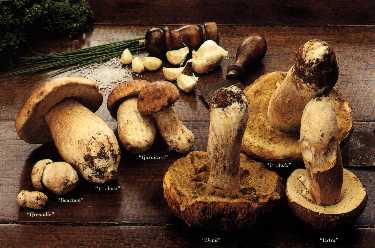
Provenance : Turkey, Macedonia, Bulgaria, Slovenia, Yugoslavia, Serbia, Poland, France,
Spain, Portugal, Morocco, South Africa.
Season : June, September to November (February/March in South Africa)
Habitat : in clearings and on the edges of woods (oak, beech, chestnut and hornbeam trees)
Taste : characteristic and pronounced, like hazelnut or chestnut.
Cooking tips :
The Boletus is well-appreciated and is used in many traditional recipes. It also inspires cooks for modern and original dishes. Both the cap and the stem are delicious. The Boletus can be eaten raw, marinated in salads, cooked in pâtés, stuffings or pies. It can also be fried, grilled or used as a garnishing. Prepared simply with parsley in an omelette, or with pasta or potatoes, the Boletus is also delicious.
|
RANGE |
FRESH |
FROZEN |
TINNED |
DRIED |
BRINE |
|
References |
Baby Cep, extra, first choice,
|
Raw (Baby Cep, extra, whole, cubes, pieces), blanched and cooked |
« Au naturel », in oil, cooked, mashed, juice |
Sliced (special, extra, choice, standard,industrial |
Whole, stems and pieces |
|
Packaging |
Punnets 125 or 250g Packets 1 and 3kg |
Plastic bags 300 and 450g,1 and 2,5kg Punnets 150g (fried) Packets 5 and 10kg |
Tins 1/4,1/2,4/4,5/1, Glass jars 23, 44, 66cl |
Plastic jars 25, 50, and 250g Bags 25, 50, 500g Pockets 1 and 2kg |
Casks 20 and 40kg |
|
Storage |
2 to 3 days between +2 and 5°C |
18 months at –18°C |
3 years |
2 years |
1 year |


